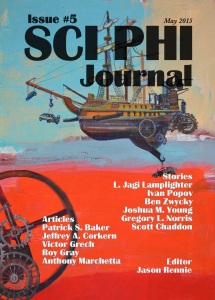
Sci Phi Journal #5, May/June 2015
Reviewed by Cyd Athens
“Sci Phi is an online science fiction and philosophy magazine. In each issue you will find stories that explore questions of life, the universe and everything and articles that delve into the deep philosophical waters of science fiction universes.” Although this is the fifth issue of Sci Phi Journal, it is the first to be reviewed by Tangent Online. Those wanting heady science fiction reads are in for a treat. As an added bonus here, a “Food for Thought” section with thought-provoking content along the lines of what one might encounter in a book discussion group follows many of the stories. Let us, then, foray into this issue’s content and see what we have.
Television viruses are the subject of Ivan Popov’s “The Keresztury TVirs.” Presented as a review of the fictitious book, World TVir History, 4th edition, the story tells of the book’s author, Andrew Keresztury, an expert in the field of TVirology—the insertion of viral code into television programming, with the results ranging from annoyance to political propaganda. The review comes across as a history of Keresztury himself. However, some of it could just as easily be do-it-yourself instructions for wannabe TVirologists. This is well enough documented that it makes one wonder whether or not something like TVirology could really happen.
In “God Eaters” by Joshua M. Young, a pair of god eaters finds a lone god in a spacefaring ship. When the eaters board the ship, the occupant manages to kill one of them and restrain the other. The surviving eater is surprised that the god did not kill it and the two of them, hunter and prey, have a few confrontational encounters before they are able to stabilize their relationship. Here, the philosophical questions go as far back as any study of humankind and ask us, among other things, whether or not we are slaves to, or masters of, our inner natures.
The unnamed narrator in “George the Second” by Gregory L. Norris, tracks down the reincarnation of an old friend, George Curtis Henry, who died nineteen years earlier, after learning that George’s family has won the lottery. The narrator isn’t interested in the lottery, but in seeing the new incarnation of his old friend. When he meets the teenaged George, who died in a car crash, the youngster is on a short parental leash with parents who won’t let him drive because of how the original George died. This story about second chances begs questions about reincarnation and the soul.
Scott Chaddon’s “The Great Teacher” gives us Colonel Reed Logan who awakens from cryosleep to find himself on a planet with not only two moons but also a statistically impossible thriving human community. That’s the good news; the bad being that his spaceship was damaged during the long voyage and he is the only survivor. As Logan investigates the new location, he notes that there is only one person over the age of twenty-five—an old man whom everyone else calls Father. Encouraged to speak with Father, Logan eventually does. What he learns from the older man puts the story in a new light and makes one wonder what s/he would do in Logan’s situation.
When Clara’s car is stolen by faerie pirates aboard the “HMS Mangled Treasure,” L. Jagi Lamplighter’s protagonist spends some time at the library learning what she can about faeries. Clara simply must retrieve her car because her special needs son’s doll, Mr. Spaghetti, was in the vehicle, and the boy, Sammy, is not only inconsolable, but also occasionally violent without the doll. So, Clara uses the last of her credit to rent a car, parks it in a location where she is pretty sure it will be stolen, and prays for the vehicle, with her hiding in the back seat, to be taken. Once her prayer is answered, she finds Mr. Spaghetti. Unfortunately, she also finds evil faerie pirates run amok, enslaving human children. She wants to free all the children. However, in order to do so, she must make a heart-wrenching decision. This is a story which encourages thought about love, souls, and what makes something real.
Sci Phi Journal has given us science fiction to not only read, but also ponder. We look forward to reading, and pondering, more.
Cyd Athens indulges a speculative fiction addiction from 45ø 29 30.65 N, 122ø 35 30.91 W. Comments on Cyd’s reviews are welcome at www.cydathens.net.